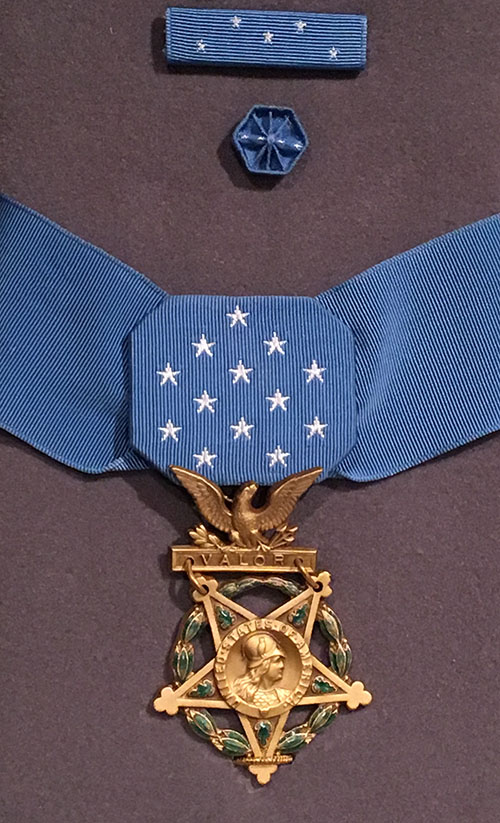-
Private
George WatsonOn the morning of March 8, 1943, Private George Watson was aboard the Dutch Steamer ’s Jacob, which was moored at Porloch Harbor on the island of New Guinea. Watson was far from home.
The Birmingham, Alabama, native graduated from the Colorado Agricultural and Mechanical College in 1942 and entered the US Army via the draft at age 28. He was assigned to the 29th Quartermaster Regiment, 2nd Battalion, which deployed to the Pacific theater shortly after Watson finished training. He worked in logistics. -
 Private George Watson gave his life March 8, 1943, saving comrades as Japanese bombers rained fire upon the ’s Jacob, a ship on which Watson was stationed in New Guinea. According to his citation, Watson’s “extraordinarily valorous actions, daring leadership, and self-sacrificing devotion to his fellow man exemplify the finest traditions of military service.” Courtesy of the Congressional Medal of Honor Society.
Private George Watson gave his life March 8, 1943, saving comrades as Japanese bombers rained fire upon the ’s Jacob, a ship on which Watson was stationed in New Guinea. According to his citation, Watson’s “extraordinarily valorous actions, daring leadership, and self-sacrificing devotion to his fellow man exemplify the finest traditions of military service.” Courtesy of the Congressional Medal of Honor Society.
On that fateful March morning, Japanese bombers rained fire upon the ’s Jacob, catching the Americans off guard. The ship was abandoned, with many of its crewmembers jumping overboard in a last-ditch attempt to survive the onslaught. -
Private Watson was among them, though he did not leave the ship to save his own life. According to his Medal of Honor citation, “instead of seeking to save himself,” Watson “remained in the water assisting several soldiers who could not swim to reach the safety of the raft.” Watson saved the lives of “several comrades.”
-
 When the decision was made to award George Watson and the Medal of Honor in 1997, no living family members could be found. His medal was accepted by the US Army Quartermaster Museum in Fort Lee, Virginia. In 1997, a new transport ship, the USNS Watson was named in honor of Private Watson. On loan courtesy of the US Army Quartermaster Museum.
When the decision was made to award George Watson and the Medal of Honor in 1997, no living family members could be found. His medal was accepted by the US Army Quartermaster Museum in Fort Lee, Virginia. In 1997, a new transport ship, the USNS Watson was named in honor of Private Watson. On loan courtesy of the US Army Quartermaster Museum.Exhausted from his heroic efforts, Watson drowned that day. His actions earned him the Army’s second-highest award—the Distinguished Service Cross. He was the first African American to receive the decoration in World War II. And, in 1997, Watson was one of seven African Americans awarded the Medal of Honor by President Bill Clinton. No African Americans received the Medal of Honor in the years immediately after the war.
-
According to his citation, Watson’s “extraordinarily valorous actions, daring leadership, and self-sacrificing devotion to his fellow man exemplify the finest traditions of military service.”
This Memorial Day, Honor Private George Watson
-
Share on Facebook
-
Tweet Your Thanks
Tweet -
Explore More Stories
From Our Collection

